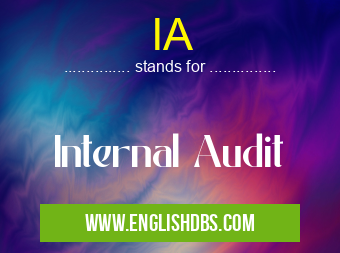What does IA mean in BANKING
INTERNAL AUDIT (IA) is an independent and objective review of the operations and management processes of organizations. It includes a comprehensive assessment of organizational risk management, control, governance processes and business systems. Internal Audits can provide assurance that the organization has effective controls in place to reduce fraud, errors and other risks.

IA meaning in Banking in Business
IA mostly used in an acronym Banking in Category Business that means Internal Audit
Shorthand: IA,
Full Form: Internal Audit
For more information of "Internal Audit", see the section below.
Essential Questions and Answers on Internal Audit in "BUSINESS»BANKING"
What is Internal Audit?
Internal Audit is an independent and objective review of the operations and management processes of organizations. It includes a comprehensive assessment of organizational risk management, control, governance processes and business systems.
How does Internal Audit Help Organizations?
Internal audits help organizations identify weaknesses in their internal controls and processes; as well as evaluate the efficiency and effectiveness of existing procedures to ensure safety, security, accuracy, reliability and compliance with internal regulations. Additionally, it helps develop recommendations for improvement when needed.
What are some benefits of an Internal Audit?
Benefits of an internal audit include access to timely operational data; identification or potential issues or risk before they become major problems; improved communication between areas within the organization; increased confidence among key stakeholders that operations are running smoothly; cost savings through improved efficiency; and better decision making through more accurate information.
Who conducts Internal Audits?
Internal auditors are typically employees of the company but may also be hired from outside firms who specialize in this area. They have specialized training or qualifications in accounting or auditing principles which allows them to evaluate internal controls and assess potential risks faced by organizations.
How often should Internal Audits take place?
The frequency of internal audits will depend on the nature and size of your organization, industry sector standards as well as local laws or regulations relating to your particular industry. Generally speaking it is best practice to conduct an audit at least once per year but more frequent audits may be required if there are significant changes in personnel or any new processes or systems that have been implemented.
Final Words:
Internal audit plays a huge role for companies by assessing their operational efficiency & effectiveness, thereby helping reduce risk & improve overall performance. It provides assurance to key stakeholders that all operational processes are running smoothly & efficiently while identifying any areas for improvement & ensuring compliance with relevant laws & regulations.
IA also stands for: |
|
| All stands for IA |
